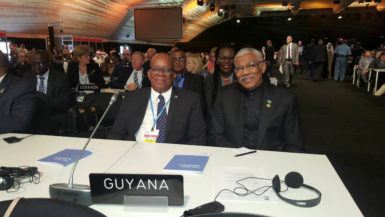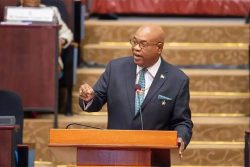President David Granger yesterday committed Guyana to honouring the terms of the Paris Agreement on climate change and said his government would pursue the establishment of a Green State.
Speaking at the Twenty Second Session of the Conference of Parties of the
United Nations Framework Convention on Climate Change in Morocco, Granger said that Guyana demonstrated its commitment to the pact by becoming the seventeenth state to deposit its instrument of ratification of the Paris Agreement on climate change, to the United Nations.
Amid growing international concern that US President-elect Donald Trump intends to pull his country out of the agreement, Granger listed Guyana’s plans.

He said that Guyana will honour its obligations under the Paris Agreement through the development of a comprehensive Emissions Reduction Programme. It will:
* pursue the establishment of a Green State, characterised by a low-emission pathway to economic development;
* place an additional two million hectares of our territory under conservation and preserve our rainforests in order to contribute up to 48.7 million tonnes of carbon dioxide equivalent, to the global climate mitigation effort through avoided deforestation;
* position our country to move more quickly and more closely towards full renewable energy use by 2025; and
* protect our biodiversity and ecosystems and partner with other countries to establish an international institute specialising in education and research in biodiversity.
Granger said that Guyana has been playing a big role in mitigating the effects of climate change.
“We have demonstrated how small states could contribute to solving major global concerns, particularly those relating to the environment.
“Guyana is central to the contribution, which small states can make to mitigate climate change. Guyana is one of a few countries, which are net carbon sinks. Guyana’s rainforests cover more than 85 percent of its land space. Those rainforests sequester more carbon than the country’s human activities generate”, he stated.
He noted that Guyana is at the centre of the Guiana Shield – one of the world’s last remaining blocks of virgin tropical rainforest.
Granger added that Guyana supports global partnerships in order to ensure implementable actions to keep global temperature rise well below 2 degrees Celsius above pre-industrial temperatures, while pursuing efforts to limit it to 1.5 degrees Celsius.
He called for consideration to be given to the particular vulnerabilities of Small Island developing states and low-lying coastal states, especially those of the Caribbean, Pacific and Indian Ocean.
Guyana also supports the call for increased climate financing, particularly for adaptation, and based on “vulnerabilities of countries and not their economies measured by their Gross Domestic Product.”








